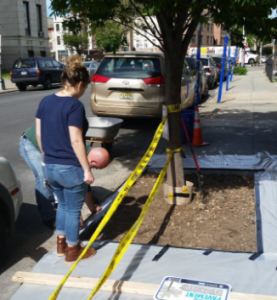Three New Jersey Cities Use Citizen-Powered Initiatives to Tackle Stormwater Runoff
In New Jersey, our oldest cities and towns are facing a crisis. Dense development, roads and parking lots mean that there are few natural areas to absorb stormwater runoff, and climate change has intensified precipitation events. The result- cities across the state are susceptible to major flooding, sometimes after even modest rain events. The problem is even worse in the 21 cities with combined sewer overflows (CSOs) where raw sewage discharges into nearby rivers and bays. Fortunately, opportunity came knocking!
Three New Jersey CSO cities, out of seven other cities around the country, were recently awarded the Cities of Service Prepared Together grant in order to launch new initiatives that will create more sustainable and resilient communities. The program, funded by the Walmart Foundation, will expand disaster preparedness in Hoboken, Jersey City, and Newark. Each city will receive a $25,000 grant, high-touch consulting services, programmatic support, and two AmeriCorps VISTA members for one year.
The severity of the water infrastructure crisis and its impact on community resiliency in New Jersey is highlighted by each city’s commitment to use these new resources to invest in stormwater mitigation techniques. Over the next year, green infrastructure installation and maintenance will be the focus for our Prepared Together cities as they tackle inadequate stormwater infrastructure and CSOs.

City Leaders from Hoboken, Jersey City and Newark Describe Their Approach
The City of Hoboken will develop a workforce training program in green infrastructure installation, operations, and maintenance to increase the performance and maintenance of green infrastructure in the city. Volunteers who participate in the program are eligible for hands-on green jobs training provided by local universities and job placement assistance through the program. The city will develop systems and volunteer networks that engage low-income communities and high school students in green infrastructure.
“This grant will make Hoboken a more sustainable and resilient community by providing green jobs training for low-income residents and high school students, while helping us expand and maintain our green infrastructure”– Hoboken Mayor Dawn Zimmer
Jersey City’s program will identify and map flood-sensitive areas, and raise awareness and increase understanding of green infrastructure projects and their general maintenance requirements. The Jersey City Office of Innovation uses strategic communications tools to highlight the benefits of green infrastructure, including the more ancillary benefits such as improved air quality, urban heat mitigation, increased property values and neighborhood beautification and groundwater recharge.
“Beyond simply planting more trees, rain gardens, and other types of green infrastructure, we hope to foster a sense of ownership in green infrastructure among community members, raise awareness of green infrastructure and its relationship to street flooding and CSO issues, and ensure the long-term viability of green infrastructure installations through community maintenance.” — Brian Platt, Director, Jersey City Office of Innovation
With nearly 70 percent impervious cover throughout the City of Newark, extreme weather events can lead to excessive stormwater runoff and cause major disruptions and inconveniences for residents. Through the Prepared Together program, volunteers will help to tackle Newark’s landscape challenges by planting trees and installing rain barrels and cool roofs. In addition to increasing awareness of green infrastructure, this program will inspire community pride and civic engagement by allowing residents to step into leadership roles to help solve problems that affect their daily lives.
“Green infrastructure projects are a cost-effective way to mitigate stormwater while also providing a variety of community benefits including better water quality and air quality, reduced energy use, increased recreation space, climate resiliency and economic growth.” — Nathaly Agosto Filion, Chief Sustainability Officer, City of Newark
From Lessons Learned to Model Program
Using an approach known as Impact Volunteering, each city will strengthen the relationship between citizen volunteers and their municipal governments so that they may identify and solve public problems together. As partners, residents and city officials can target public issues strategically and facilitate thoughtful, cross-sector discussions about what should be done. Not only do city officials have an opportunity to understand community issues from a new perspective, residents have a chance to get involved in the solutions. Over this next year each city will encounter challenges and learn lessons that might serve as a model for other New Jersey cities and towns to consider as they approach stormwater runoff issues.